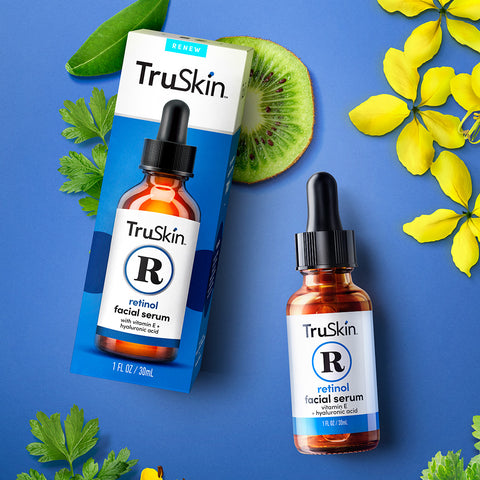
Hands Down The Best Ingredients For Renewing Your Skin
Who’s in the market for fresh, revitalized skin for spring? The real question is who isn’t?
If your skin is screaming ‘tired, worn-out and kinda lackluster', the good news is (hold on, there’s some good news?) you’re not alone. Google searches for ‘how to get naturally glowing skin’ and ‘how to keep skin younger and glowing’ continue to trend, proving that when it comes to covetable skin, freshness and radiance are everything.
Which figures. After all, fine lines, wrinkles, pimples and dark spots immediately appear less obvious if your overall complexion looks good. Refreshed, clean, glowy skin also knocks years off you, and don’t even get us started on how simply looking more wide-awake makes you immediately feel better and more raring to go. Oh, the power of being happy in your own skin…
So, how can you up your radiance game? Well, exfoliating your skin with a gentle scrub or rinsing your face with cold water are decent places to start. But to really get ‘under your skin’, if you will, and reap lasting benefits, you should think about incorporating some kind of active ingredient into your daily routine. Specifically, one that’s known for accelerating cell turnover and loaded with skin-renewing powers.
So, just what are these masterful ingredients? Let’s see, shall we?
Retinol
We could go on for weeks about the benefits of retinol on both aging and acne-prone skin (don’t worry, we won’t), but when it comes to skin renewal, we do have a few things to say. First, retinol is the best. And second? Well, do you need a second?
A derivative of vitamin A, retinol gets converted into retinoic acid when absorbed by your skin. And it’s this retinoic acid that works hard at a cellular level, kickstarting collagen and elastin production, boosting cell turnover and stimulating blood circulation to help make your skin thicker, firmer, stronger and brighter.
Of course, every silver lining has its cloud and retinol is a potent little beast that needs to be used with caution and care. The number one rule is that any new retinol product should be patch tested first to check for adverse reactions. Then, and only then, should you introduce it slowly into your skincare routine, starting with once a week and building to daily as your skin acclimates. This helps avoid irritation and gives your skin time to adjust to turning over at a faster rate.
Looking to refresh and revive your skin long-term? Then retinol has to be top of the list. It just has to.
Try: Retinol Facial Serum
Glycolic Acid
Exfoliating acids are another must for fresh, renewed skin and if you’re looking for the absolute queen, look no further than glycolic acid.
Glycolic acid is derived from sugar cane and belongs to a group of acids called alpha hydroxy acids, or AHAs. When applied to the skin, AHAs work by softening the bonds between dead skin cells, which encourages them to slough away more easily and make way for the newer, healthier cells underneath. Kind of like physically exfoliating your skin with a scrub... but minus the effort!
By improving desquamation (the fancy term for the shedding of dead skin cells), glycolic acid also stimulates cell regeneration, making your skin look and feel way better over time.
Glycolic acid has the smallest molecular size of all AHAs, making it one of the most effective and potent exfoliating acids out there. It’s trusted by pros and often used in chemical peels, but you can also find it in lower concentrations in loads of skincare serums and treatments. But remember, just like retinol, glycolic acid packs a punch, so it should always be applied with caution.
Try: Ocean Mineral Super Toner
Peptides
Peptides are a bit trickier to get your head around, but bear with us because they’re an absolute must for skin renewal.
Made up of short chains of amino acids, peptides help your skin produce proteins like collagen and elastin. How so? Proteins are similarly comprised of amino acids, which allows peptides to act like little messengers, searching out depleted proteins and ‘telling’ your skin to produce more collagen and elastin where it needs them most. Think of peptides as building blocks for the structure, firmness and elasticity of your skin.
There are hundreds of peptides out there – some of which are awesome and some which, frankly, aren't even close. Good ones to look out for are Matrixyl 3000 and palmitoyl tripeptides, which have been proven to boost collagen production in aging skin. Studies have even suggested that Matrixyl 3000 has the potential to almost double the amount of collagen your skin produces. Impressive stuff, don’t you agree?
Try: Peptide Anti-Aging Eye Gel
Vitamin C
You’re probably aware of how much we love vitamin C here at TruSkin HQ. After all, our entire skincare range stemmed from our award-winning Vitamin C Serum, which continues to be a fan favorite. And rightly so.
Vitamin C is one of the most researched and trusted antioxidants in skincare, but it’s so much more than a free radical neutralizer and fighter of environmental (cough, sun) damage. Of course, all this is super important for the feel, look and health of your skin because nixing free radicals helps keep your collagen and elastin levels at their peak, which simultaneously maintains efficient cellular turnover. But vitamin C has another trick up its sleeve for giving your skin that extra glow factor. And this is its ability to inhibit melanin production.
As we’re sure you know, melanin is the pigment that gives your skin (as well as your hair and eyes) its unique color. Sun exposure ramps up melanin production, which is why you tan. However, melanin can get a little out of whack sometimes, producing dark, uneven spots known as hyperpigmentation: bad news if fresh-looking skin is your mojo. Vitamin C helps keep melanin under control by inhibiting tyrosinase, an enzyme which catalyzes melanin production. Clever vitamin C.
Try: Vitamin C Brightening Moisturizer
Niacinamide
Otherwise known as vitamin B3, niacinamide is one of the gentlest active ingredients in skincare. But don’t let its gentle nature fool you because it more than holds its own when it comes to strengthening, renewing and energizing your skin.
Like vitamin C, topical niacinamide is another hardworking antioxidant that keeps skin-damaging free radicals in check. It also increases ceramide production in the uppermost layers of your skin to help strengthen your barrier function (very important, btw) and improve your skin’s resiliency. Ceramides are waxy lipids that work like glue to hold your skin together, keeping toxins out and moisture in. Like most of the good stuff in your skin, your natural levels of ceramides deplete as you get older, which is why boosting production is so important. In a nutshell, more ceramides = better hydration and fewer issues like dryness and itchy skin.
Niacinamide has also been proven to help brighten skin, although exactly how it does this is still not entirely known. Ooh, a mysterious one, we like that.















